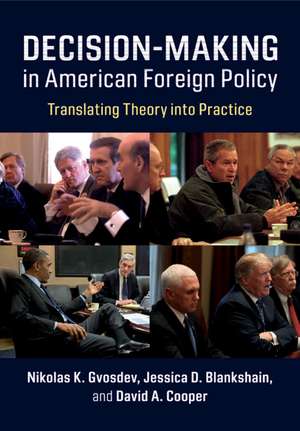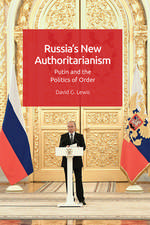Decision-Making in American Foreign Policy: Translating Theory into Practice
Autor Nikolas K. Gvosdev, Jessica D. Blankshain, David A. Cooperen Limba Engleză Paperback – 23 ian 2019
Preț: 276.75 lei
Nou
Puncte Express: 415
Preț estimativ în valută:
52.96€ • 55.43$ • 44.08£
52.96€ • 55.43$ • 44.08£
Carte tipărită la comandă
Livrare economică 31 martie-14 aprilie
Preluare comenzi: 021 569.72.76
Specificații
ISBN-13: 9781108447683
ISBN-10: 1108447686
Pagini: 436
Ilustrații: 40 b/w illus. 2 tables
Dimensiuni: 178 x 254 x 18 mm
Greutate: 0.91 kg
Editura: Cambridge University Press
Colecția Cambridge University Press
Locul publicării:New York, United States
ISBN-10: 1108447686
Pagini: 436
Ilustrații: 40 b/w illus. 2 tables
Dimensiuni: 178 x 254 x 18 mm
Greutate: 0.91 kg
Editura: Cambridge University Press
Colecția Cambridge University Press
Locul publicării:New York, United States
Cuprins
List of figures; List of boxes; Preface; Author note; 1. Introduction; 2. Foreign policy analysis; 3. Unitary state perspective; 4. Cognitive perspective; 5. Organizational process perspective; 6. Bureaucratic politics perspective; 7. Palace politics perspective; 8. Sub-bureaucratic politics perspective; 9. Domestic politics; 10. Other countries; 11. Conclusion; Annex: case studies; Index.
Recenzii
'This insightful book peers inside the black box of national security decision-making through the prism of real, recent, and relevant cases.' Graham Allison, Douglas Dillon Professor of Government, Harvard University, Massachusetts
'This is the perfect textbook for graduate and advanced undergraduate students who want to gain the conceptual tools they need to be successful foreign policy practitioners. Students will come away with a deep understanding of how the Executive and Legislative branches of the US government operate as well as a comparative perspective on decision-making in other countries.' James Goldgeier, American University, Washington, DC
'This fresh new textbook in foreign policy analysis is very welcome. From a pedagogical standpoint, it is organized extremely well, unfolding each layer of analysis through copious and current examples, case studies, guiding questions, and useful summaries. From a theoretical standpoint, in addition to covering the expected FPA levels of analysis, it offers the best exploration of sub-bureaucratic politics I've seen. I highly recommend this book both for classroom use as well as for the scholar's bookshelf.' Valerie M. Hudson, Texas A&M University
'This is an invaluable and comprehensive guide to academic theories about how the American national security system works in practice. This textbook fills a critical gap in making the theories of foreign policy analysis understandable and relevant for current and future practitioners. Speaking as a current academic and former military leader, I strongly recommend this as essential reading for civilian and military students alike who are seeking to hone their skills to become effective and successful national security professionals.' James Stavridis, retired Admiral, US Navy, Supreme Allied Commander, NATO (2009–13), Dean Emeritus, The Fletcher School of Law and Diplomacy (2013–18)
'This is the perfect textbook for graduate and advanced undergraduate students who want to gain the conceptual tools they need to be successful foreign policy practitioners. Students will come away with a deep understanding of how the Executive and Legislative branches of the US government operate as well as a comparative perspective on decision-making in other countries.' James Goldgeier, American University, Washington, DC
'This fresh new textbook in foreign policy analysis is very welcome. From a pedagogical standpoint, it is organized extremely well, unfolding each layer of analysis through copious and current examples, case studies, guiding questions, and useful summaries. From a theoretical standpoint, in addition to covering the expected FPA levels of analysis, it offers the best exploration of sub-bureaucratic politics I've seen. I highly recommend this book both for classroom use as well as for the scholar's bookshelf.' Valerie M. Hudson, Texas A&M University
'This is an invaluable and comprehensive guide to academic theories about how the American national security system works in practice. This textbook fills a critical gap in making the theories of foreign policy analysis understandable and relevant for current and future practitioners. Speaking as a current academic and former military leader, I strongly recommend this as essential reading for civilian and military students alike who are seeking to hone their skills to become effective and successful national security professionals.' James Stavridis, retired Admiral, US Navy, Supreme Allied Commander, NATO (2009–13), Dean Emeritus, The Fletcher School of Law and Diplomacy (2013–18)
Notă biografică
Descriere
This book translates US foreign policymaking theory into practical analytic tools for those preparing to be national security professionals.

